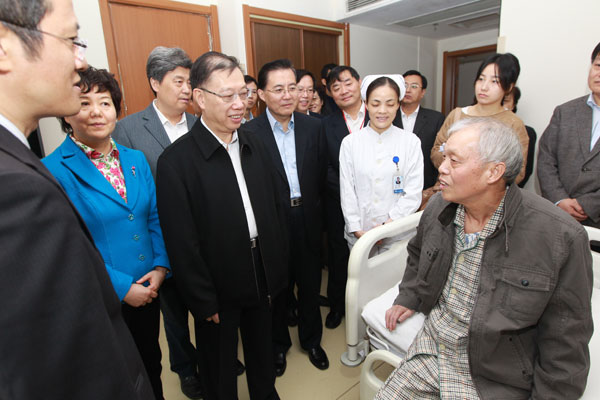New lease of life for donations of organs
Updated: 2011-11-21 06:36
By Shan Juan (China Daily)
|
|||||||||||
 |
|
Vice-Minister of Health Huang Jiefu visits Tian Bingrong, 64, who underwent a lung transplant at Wuxi People's Hospital in East China's Jiangsu province on Nov 17, 2011.[China Daily] |
WUXI, Jiangsu - Organ donations will be promoted and the system expanded to boost the number of transplants, Vice-Minister of Health Huang Jiefu said.
A public organ donation system is still undergoing trials and covers just 16 regions on the mainland, Huang told China Daily in an exclusive interview on Thursday.
"Starting 2012, the trial system will be expanded nationally and authorized organ transplant centers, which do not carry out transplants using publicly donated organs over two years, will be suspended from performing the procedure," Huang said.
Huang, one of the leading specialists in the field, underwent liver-transplant training in Australia.
As of now, 163 hospitals on the mainland are authorized by the ministry to do transplants. About 10,000 are carried out annually, according to official statistics.
In 2009, the Red Cross Society of China and the Ministry of Health piloted a system that focused on public donation, procurement, a volunteer program and no payments.
By the end of October, 128 people had donated organs through the system, enabling more than 320 transplants, statistics from the society showed.
Shi Bingyi, vice-chairman of the Chinese Transplant Society, said although China is now on the right track, fully establishing a public-donation system will take time given that it took the United States around 30 years to establish such a system.
Wang Ping, director of the relief and health department at the Red Cross Society of China, told China Daily that they are now working to scale up the system.
"Also, we're waiting for the revised organ transplant regulation, which would give full legal footing for the Red Cross Society to be involved in organ donations," he said.
According to Huang, a revised version of the regulation, which was first issued in 2007, will soon be publicized, though no timetable was given.
Under the new regulation, Red Cross responsibility will include donation promotion, donor registration, witnessing donations, organ allocation and donor family support, he said.
A new clause, stating that citizens are encouraged to agree to donate in case of death, will be added.
Tian Bingrong, 64, in Wuxi said that without organ donation he would not have survived the year.
Tian had pneumoconiosis, a lung disease usually caused by inhaling coal dust over a long period, for more than 20 years. He can now breathe freely again after a lung transplant at the Wuxi People's Hospital on Nov 2, said the hospital's deputy director Chen Jingyu. The surgery cost Tian at least 300,000 yuan ($47,000).
According to Chen, the donor was a 17-year-old migrant worker who died in a traffic accident. His family decided to donate the young man's organs to help save the lives of others.
The Red Cross offered to help the donor's family.
"We set up a special fund to deliver humanitarian support to needy donor families," said Xu Jun, who heads the Wuxi Red Cross Society.
Specifically, they help deal with the donor's medical bill and funeral costs and give 40,000 yuan to help the family financially, he said.
"We have to make sure that organ donation doesn't negatively affect the donor family's financial situation," said Huang.
"The entire process is consistent with international ethics and standards," he stressed.
Xu agreed and said he noted a real interest among the public.
"Donors and their families deserve a helping hand, particularly when the nation's welfare and social security programs remain limited."
A survey involving 606 college students in Wuhan and Guangzhou showed that 34 percent want to be organ donors.
"China has a large pool of potential donors to tap into," Xu said. But only 10,000 out of 1.5 million patients waiting for transplants annually get them as there is an acute organ shortage.
He also pointed out that work behind the scenes, such as detecting and organizing donations, requires more helpers and funding.
Huang said that the government is making arrangements to deal with this.
The new regulations will also tighten rules regarding donations by living donors, he said.
For example, in a standard transplant more than half of the donor's liver will be taken out but scientific study shows that more than 30 percent of donors develop complications that can lead to death.
Between 2001 and 2006, the ministry recorded at least five deaths of otherwise healthy donors after liver transplants.
Some organ traffickers and hospitals cooperate to produce fake documents to claim a "blood" relationship between a living donor and recipient to allow the surgery to take place.
The new regulation will stipulate that any relationship claimed has to be verified, Huang said.
Previous reports said transplants by living donors peaked around 2008 when they accounted for nearly 40 percent of the total on the mainland.
Supervision and management of transplant centers and surgeons will also be further strengthened, Huang said.
"A special registration and management system of transplant surgeons will be set up," he added.
So far, seven transplant centers have been disqualified and eight doctors have had their licenses revoked for violations, statistics showed.
Hot Topics
HIV/AIDS, Egypt protest, Thanksgiving, climate change, global economic recovery, home prices, high-speed railways, school bus safety, Libya situation, Weekly photos
Editor's Picks

|

|

|

|

|

|







